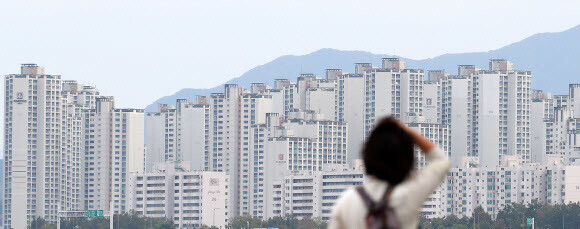hankyoreh
Links to other country sites 다른 나라 사이트 링크
Only half of Gyeonggi residents see marriage as necessary, survey finds

Around half of Gyeonggi Province residents see marriage as optional, with only around three out of 10 female residents in their 20s expressing positive views toward marriage, survey results show.
On Oct. 16-18, Gyeonggi Province conducted a survey in which 2,000 residents were asked about their perceptions on marriage, children, and South Korea’s low birth rate. The results showed 52% of respondents agreeing when asked whether they saw marriage as “necessary.”
The proportion of respondents agreeing that marriage is necessary previously slipped from 63% in an April 2017 survey to 54% in a survey from October 2019, with a total decline of 11 percentage points in three years.
Among respondents in the 20-49 age range, less than half (47%) agreed that marriage is necessary. Among female respondents in their 20s, 30s and 40s, the rates were even lower at 32%, 40% and 40%, respectively.
Sixty-five percent of respondents agreed that couples should have children after marriage. The proportion of respondents agreeing that couples should have children has shown a decreasing trend, with respective percentages of 74% and 69% in the April 2017 and October 2019 surveys. Among respondents aged 20 to 49, 58% said that couples should have children; once again, the rates were lower among female respondents in their 20s, 30s and 40s at 42%, 51% and 59%, respectively.
The most commonly cited reason for the increased trend of not marrying was the excessive burden of residential costs such as housing prices, key money deposits, and rent (31%), followed by burdens associated with childbirth and child-raising (25%) and an emphasis on personal fulfillment and leisure (18%).
Eighty-six percent of respondents agreed that South Korea’s low birth rate is a “serious” issue. The most commonly named reason for the low birth rate was the economic burden of child-raising and private education costs (33%), followed by excessive resident costs (18%) and an emphasis on personal lives (13%). Male respondents cited excessive residential costs twice as often as female ones (24% to 12%), while female respondents cited an emphasis on personal lives more often than male ones by a margin of 16% to 10%.
The automated response survey was conducted by the polling organization Real Meter at the request of Gyeonggi Province. The margin of error was ±2.2 percentage points with a 95% confidence level.
By Hong Yong-duk, South Gyeonggi correspondent
Please direct comments or questions to [english@hani.co.kr]

Editorial・opinion
![[Column] Season 2 of special prosecutor probe may be coming to Korea soon [Column] Season 2 of special prosecutor probe may be coming to Korea soon](https://flexible.img.hani.co.kr/flexible/normal/500/300/imgdb/original/2024/0426/3317141030699447.jpg) [Column] Season 2 of special prosecutor probe may be coming to Korea soon
[Column] Season 2 of special prosecutor probe may be coming to Korea soon![[Column] Park Geun-hye déjà vu in Yoon Suk-yeol [Column] Park Geun-hye déjà vu in Yoon Suk-yeol](https://flexible.img.hani.co.kr/flexible/normal/500/300/imgdb/original/2024/0424/651713945113788.jpg) [Column] Park Geun-hye déjà vu in Yoon Suk-yeol
[Column] Park Geun-hye déjà vu in Yoon Suk-yeol- [Editorial] New weight of N. Korea’s nuclear threats makes dialogue all the more urgent
- [Guest essay] The real reason Korea’s new right wants to dub Rhee a founding father
- [Column] ‘Choson’: Is it time we start referring to N. Korea in its own terms?
- [Editorial] Japan’s rewriting of history with Korea has gone too far
- [Column] The president’s questionable capacity for dialogue
- [Column] Are chaebol firms just pizza pies for families to divvy up as they please?
- [Column] Has Korea, too, crossed the Rubicon on China?
- [Correspondent’s column] In Japan’s alliance with US, echoes of its past alliances with UK
Most viewed articles
- 1[Column] Season 2 of special prosecutor probe may be coming to Korea soon
- 2‘We must say no’: Seoul defense chief on Korean, USFK involvement in hypothetical Taiwan crisis
- 3Is N. Korea threatening to test nukes in response to possible new US-led sanctions body?
- 4Amnesty notes ‘erosion’ of freedom of expression in Korea in annual human rights report
- 5Division commander ordered troops to enter raging flood waters before Marine died, survivor says
- 6N. Korean delegation’s trip to Iran shows how Pyongyang is leveraging ties with Moscow
- 7[Editorial] Korea’s surprise Q1 growth requires objective assessment, not blind fanfare
- 8Is Japan about to snatch control of Line messenger from Korea’s Naver?
- 9No good, very bad game for Korea puts it out of Olympics for first time since 1988
- 10[Reportage] On US campuses, student risk arrest as they call for divestment from Israel